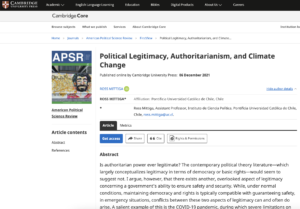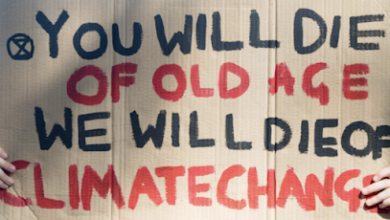Paper published in prestigious journal laments ‘democracy’ & calls for ‘authoritarian environmentalism’ modeled after COVID lockdowns to fight climate ’emergency’ – Watts Up With That?

Political Legitimacy, Authoritarianism, and Climate Change – Published online by Cambridge University Press – American Political Science Review – December 6, 2021
ROSS MITTIGA – Assistant Professor, Instituto de Ciencia Política, Pontificia Universidad Católica de Chile, Chile, [email protected]
Abstract Excerpt: Is authoritarian power ever legitimate? … While, under normal conditions, maintaining democracy and rights is typically compatible with guaranteeing safety, in emergency situations, conflicts between these two aspects of legitimacy can and often do arise. A salient example of this is the COVID-19 pandemic, during which severe limitations on free movement and association have become legitimate techniques of government. Climate change poses an even graver threat to public safety. Consequently, I argue, legitimacy may require a similarly authoritarian approach.”
. 
.
The paper’s author Ross Mittaga, calls for “authoritarian environmentalism” to address the alleged climate “emergency.” : “It is ultimately an empirical question whether authoritarian governance is better able to realize desired environmental outcomes and, if so why and to what extent? Yet, it is undeniable that nearly all wealthy democratic states have failed to respond adequately to the climate crisis. By contrast, various less affluent authoritarian regimes have been successful in implementing stringent climate policies…”
#
Climate Depot Note: Here is a full report on the growing movement to push climate lockdowns:Reality Check: ‘Climate lockdowns’ touted by Gates & Soros funded professors, Govts, media, & academia
Watch: Morano’s full 25 min speech on Climate Lockdowns at Heartland Skeptic Conference in Las Vegas
By: Marc Morano – Climate Depot
December 31, 2021
Abstract: Is authoritarian power ever legitimate? The contemporary political theory literature—which largely conceptualizes legitimacy in terms of democracy or basic rights—would seem to suggest not. I argue, however, that there exists another, overlooked aspect of legitimacy concerning a government’s ability to ensure safety and security. While, under normal conditions, maintaining democracy and rights is typically compatible with guaranteeing safety, in emergency situations, conflicts between these two aspects of legitimacy can and often do arise. A salient example of this is the COVID-19 pandemic, during which severe limitations on free movement and association have become legitimate techniques of government. Climate change poses an even graver threat to public safety. Consequently, I argue, legitimacy may require a similarly authoritarian approach. While unsettling, this suggests the political importance of climate action. For if we wish to avoid legitimating authoritarian power, we must act to prevent crises from arising that can only be resolved by such means.
#
Below is an analysis of the new study by Professor Alexander Wutke, Political Psychology at U Mannheim who does not support the paper’s ideas.
https://threadreaderapp.com/thread/1476850341564063756.html
Other academics have critiqued the paper.
Professor Alexander Wutke, Political Psychology at U Mannheim: “A prestigious journal in political science, @apsrjournal, has published a disturbing piece of l political theory. In my reading, it explicitly argues that we must put climate action over democracy and adopt authoritarian governance if democracies fail to act on climate change. The study’s main question, as I see it, is whether we should abandon democracy to save the climate. It argues why it could be justified to dismantle democracy in order to ensure climate policies through authoritarian governance. To make the point of abandoning democratic governance the study builds on an unholy alliance of democracy-skeptic references from Hobbes to Schmitt to Extinction rebellion. … If most citizens disagree with you about the optimal trade-off between climate change mitigations and other goals, where do you take the right from to put your preferences over the expressed will of most other citizens? … Overall, I find the article troubling for the context in which it is published. We are going through a 3rd wave of autocratization as @AnnaLuehrmann / @StaffanILindber put it. Pressure on democracy is mounting from multiple sides. … In this climate, we need elites who stand up for the principle of self-governing free and equal people… I think my reading reflects the core argument of the article: a hierarchy of desired goals with climate politics first and democracy second. The article argues that crises not only can legitimize but may require authoritarian governance.”
By Alexander Wuttke
A prestigious journal in political science, @apsrjournal, has published a disturbing piece of l political theory. In my reading, it explicitly argues that we must put climate action over democracy and adopt authoritarian governance if democracies fail to act on climate change.
A longer thread to explain why I disagree with the study’s conclusion and arguments.
The author of the study is @RossMittiga.
I’ve been in touch with Ross before publishing this thread but let’s focus on the study itself.

I preface that I am no expert in political philosophy. I do not know the disciplinary standards or expectations. Please tell me where I get things wrong. Also, there is much to like about this article. It is well written and accessible for empirical scholars like myself. It does not shy away from controversial conclusions.
It is clearly written, even when calling for the dismantling of democracy. The study’s main question, as I see it, is whether we should abandon democracy to save the climate. It argues why it could be justified to dismantle democracy in order to ensure climate policies through authoritarian governance. The study preemptively states that the relative efficacy of democracies vs authoritarian is an empirical question but still expresses sympathies with climate policies of authoritarian governments.
I take from a recent @vdeminstitute symposium that democracies are more likely to provide environmental goods for their citizens – but results seem less clear for global commons including climate politics
But if it was an open question whether democracies do or do not better at climate change mitigation, where does the impetus come from to question democracy? Why not authoritarian governance and see their regime type as an obstacle to climate change mitigation? It would make equal sense to think about justifications to eradicate authoritarian governments that do not pursue sufficient climate policies.
Yet, the starting point here is to see democracy as the problem.
(This mirrors sentiments often heard from climate activists.) (Also, if it’s an open question whether regime types determine climate policies, why agonize over trade-offs between regime vs climate? If we do not know whether the two are related, why not spend the energy in areas where potential effects are promising and not open questions?) I am genuinely puzzled about the origins of this anti-democratic intuition that seems to give rise to the entire endeavor of exploring whether we should sacrifice democracy for the sake of a higher good. Still, while I cannot grasp the motivation for this question, let us take the study’s answer seriously.
To make the point of abandoning democratic governance the study builds on an unholy alliance of democracy-skeptic references from Hobbes to Schmitt to Extinction rebellion.
The core argument is a distinction between foundational (FL) and contingent legitimacy (CL).In a Hobbesian tradition, any government’s most fundamental goal is to protect the safety of its citizens which provides foundational legitimacy.
Not mitigating climate change threatens safety and thus undermines foundational legitimacy. Democracy, on the other hand, is nice to have but the principle of self-governance of free and equal people only provides contingent legitimacy.
That’s unfortunate for democracy as it now is only of secondary importance. Democracy does not fulfill primary needs. Its value is contingent and more like a fashion. In our times, people value it, but in earlier centuries people did not. So its value is not foundational but contingent on the people’s current desires.Distinguishing fundamental legitimacy (safety, climate politics) vs contingent legitimacy (democracy) is the core of the argument.
And it leads the author to anti-democratic conclusions. I find all of this troubling and not convincing.1st, what is the epistemic value of people’s opinions a few decades ago for normative judgments today?
2nd, why would climate change mitigation so clearly count as a primary goal?
3rd, why are the values we want to realize with democracy -equality and freedom- not primary goals? We could have long discussions about each of these questions. But isn’t the point of democracy to establish procedures exactly to pacify and regulate conflict over these and similar questions? Democracy is based on the principle of epistemic humility. The existence of intellectual fashions reminds us not to be too certain with our beliefs. We need democracy to decide on what the primary goods are and what is most important. If most citizens disagree with you about the optimal trade-off between climate change mitigations and other goals, where do you take the right from to put your preferences over the expressed will of most other citizens? I see the point that climate change makes our lives less safe and secure but many threats do.
Are all these (anticipated) threats reason to give up on democracy and who decides on which threats count? What I consider most valuable about this article is that it takes the problem of democratic trade-offs seriously. This is an underappreciated issue. We regularly have to balance democracy against other goals such as minority protection, rule of law of multilateralism. We too rarely discuss that, indeed, it is a (perhaps desirable) limitation of popular self-governance when courts overrule referenda or unelected international organizations put limits on parliamentary sovereignty. However, the article does not do much to help resolve these tensions. The article mainly treats these trade-offs as an either-or-question. In the rank order of legitimacy, only one goal can get first place. And this is safety (climate) and not democracy. But, in fact, institutional design is complex and often a question of degree and combination. We engage these trade-offs by, eg, tilting some rules towards rule of law and others towards pure democracy. I think the real and difficult question is not to decide whether democracy or protecting the climate is more important and then choose one over the other but how to balance multiple desirable goals at once. This is also why the article’s reference to the COVID-19 crisis is misguided. Yes, many countries changed legal rules, formal or informal institutions for decision-making to cope with the pandemic. But the point is that we never gave up on democracy.
Neither in principle nor in practice. Yes, we changed rules but not with the intention of dismantling democracy but with the goal to uphold the democratic principle in difficult circumstances. The article argues that crises not only can legitimize but may require authoritarian governance. This is not true. Democracies have fought the pandemic without giving up being democratic. (And yes, do not get me started on how democracies could have done a better job at it) (Note that the article does discuss specific authoritarian policies such as banning politicians from running for office after failing a climate litmus test, moving away from the either-or-approach that characterizes the main argument which pits democratic vs authoritarian gov) Overall, I find the article troubling for the context in which it is published.
We are going through a 3rd wave of autocratization as @AnnaLuehrmann / @StaffanILindber put it. Pressure on democracy is mounting from multiple sides. In this climate, we need elites who stand up for the principle of self-governing free and equal people.
This does not imply denying trade-offs or existing problems. To the contrary.
Being a committed democrat means acknowledging democracy’s imperfections and working on them Live in a democracy it is easy to become complacent and take freedom for granted. And it is easy to become frustrated for all the things that do not go your way. Stripping other people who disagree with you of their right to participate seems like a quick way to achieve what you think is best for society. But once we open pandora’s box we must be prepared that it will turn against ourselves some time. This article spends three sentences on the value of democracy and multiple pages on its drawbacks and flaws. It does not try to improve democracy or to make democracy compatible with the climate crisis. As a discipline, we should publish and discuss these positions and then reject them.
You made it to the end of this thread. Congratulations!
Now let me add that @RossMittiga objects that I mischaracterize his article and that he would not advocate for an either/or dichotomy or for dismantling democracy. I see the point but I think my reading reflects the core argument of the article: a hierarchy of desired goals with climate politics first and democracy second. The article argues that crises not only can legitimize but may require authoritarian governance. This is not true. Democracies have fought the pandemic without giving up being democratic. (And yes, do not get me started on how democracies could have done a better job at it) (Note that the article does discuss specific authoritarian policies such as banning politicians from running for office after failing a climate litmus test, moving away from the either-or-approach that characterizes the main argument which pits democratic vs authoritarian gov)
#






